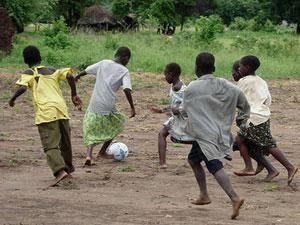What the World Cup says about the world
(Image by Mr.Fink’s Finest Photos (cc:by-nc-sa))
This story was originally covered by PRI’s “The Takeaway.” For more, listen to the audio above.
Nearly half of the world is expected to tune in to watch the World Cup this year. Teams from Europe, Asia, Australia and North and South America will bring their distinctive styles to South Africa for what is undoubtedly the biggest world sporting tournament ever held on African soil.
Each game is also fraught with geopolitical meaning, according to Steven and Harrison Stark, the father-and-son team who authored the new book, World Cup 2010: The Indispensable Guide to Soccer and Geopolitics. Harrison Stark told PRI’s “The Takeaway:”
Because of its global appeal, soccer becomes sort of a common denominator because every country plays it the same — 11 players kicking a ball for 90 minutes. The different ways that countries play soccer on the field and the way their fans experience it off it, always reveal something fundamentally true about the country.
North Korea, for example, is “probably the most defensive team in the world cup,” according to Steven Stark. That’s fitting, because it’s known as a very defensive country with tight restrictions on who can enter and leave. In fact the goal keeper once said, “my job is to keep the invaders out.”
And Spain, with its factions between the different regions and lack of central control, has traditionally had problems coming together as a team. They’re one of the most highly ranked and talented teams in the tournament, but according to Steven Stark, “they tend to fall apart in almost every tournament they’re in.”
Global racism could also have an effect on the games, according to the authors, especially for countries that are known for racism, including Italy and Spain. Black players are often derided in those countries, and the teams are largely white. The authors postulate on PRI’s “Here and Now” that the players from those teams may not be as comfortable throughout the month-long tournament, and that could affect the teams’ performances.
The authors admit that it’s not always easy for American audiences to really get into soccer. According to Steven Stark, “to step into the culture of soccer is like stepping into page 550 of a 1000 page novel.” But to do so can be rewarding, not only because of the game, but also because of what you learn about the different countries around the world.
“In the same way that you can learn a lot about Italy through its language or its food,” Steven Stark believes, “you can learn a lot about any nation on earth by the way it plays soccer and the way their fans relate to it.”
“The Takeaway” is a national morning news program, delivering the news and analysis you need to catch up, start your day, and prepare for what’s ahead. The show is a co-production of WNYC and PRI, in editorial collaboration with the BBC, The New York Times Radio, and WGBH. More at thetakeaway.org
